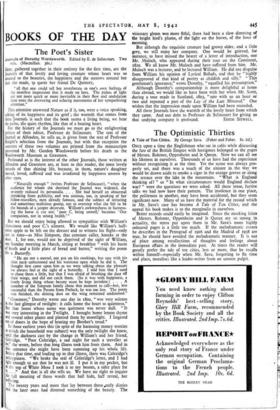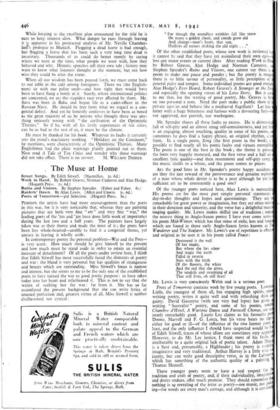The Optimistic Thirties
A Tale of Ten Cities. By George Sava. (Faber and Faber. 85. 6d.)
ONCE upon a time the Englishman who sat in cafés while discussing the fate of the British Empire with foreigners belonged to the pages of Messrs. Roluner, Oppenheim and le Qtteux. Now we can all see his likeness in ourselves. Thousands of us have had the experience without recognising it at the time. Yet the scene was always properly set, and there was a touch of the sinister in, the way we would be drawn aside to smoke a cigar in the orange groves or along the terrace over the lake in the mountains. "What is England thinking of?" or "In what circumstances would England declare war?" were the questions we were asked. All those tense, furtive talks we had now have their pattern. The insolence in one place, the politeness in another, may have been accidental, but they seem significant now. Many of us have the material for the record which in Mr. Sava's case has become A Tale of Ten Cities, and the appeal his book makes is to the marginalia in ourselves.
Better records could easily be imagined. Since the mocking hints of Messrs. Rohmer, Oppenheim and le Queux are so strong in actuality, the stress put upon them in Mr. Sava's more highly coloured pages is a little too much. If the melodramatic events he describes in the Petrograd of 1916 and the Madrid of 1938 are true, he should have avoided the melodramatic manner. It is out of place among recollections of thoughts and feelings about European affairs in the immediate past. At times the reader will greatly prefer the tale of ten cities, less or more, that he recalls within himself—especially when Mr. Sava, forgetting to fix time and place, moralises like a leader-writer from an unseen pulpit.
While keeping to the excellent plan announced by the title he is sure to keep interest alive. What danger he runs through leaving it is apparent in his protracted analysis of Mr. Neville ChamberlaiK's prologue to Munich. Flogging a dead horse is bad enough, but flogging a horse that has been such a very long time dead is insanitary. Thousands of us could do better merely by saying where we were at the time, what people we were with, how they behaved and why. Historic speeches tell their own tale' history may want to know what listeners thought at the moment, but not how wise they could be after the event.
When all our wisdom has been poured forth, we must come back to our table in the café among foreigners. There we (the Englishmen) sit with our polite smile—and how right they would have been to have flung a bottle at it. Surely, where international politics are concerned, we are the stupidest race ever affected by them. Mr. Sava was born in Baku and began life as a cadet-officer in the Russian Navy. He should be free from what we regard as a congenital defect. And yet he honestly confesses to have been as bored as the great majority of us by anyone who thought there was anything seriously wrong with "the civilisation of the Optimistic Thirties." So if he, with all his lively experiences of ten cities, can be as bad as the rest of us, it must be the climate.
He must be thanked for his book. Whatever its faults it certainly sets the mind's machinery working. "Holidays on the Continent,'' he mentions, were characteristic of the Optimistic Thirties. Many Englishmen had the plain warnings plainly pointed out to them. Now read A Tale of Ten Cities and wonder why those warnings
did not take effect. There is no answer. M. WILLSON DISHER.























 Previous page
Previous page